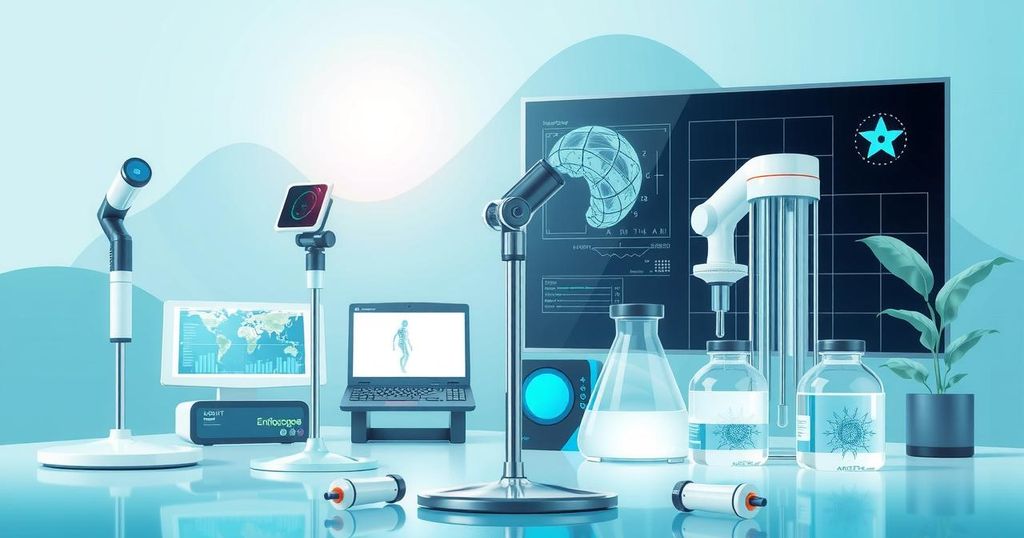AI
Tech
ALEXANDRA WHITELEY, ALUM :, ARTIFICIAL INTELLIGENCE, CHRISTOPHER A, CHRISTOPHER A. LOWRY, CU BOULDER, CU BOULDER BIOCHEMISTRY, CU BOULDER INTEGRATIVE PHYSIOLOGY, DANIEL LEONARD, ENVIRONMENTAL SUSTAINABILITY, INNOVATION, INTRALUMENUS, JESSE M. SHEPPARD, JUSTIN WHITELEY, KEVIN NOBLE, LOWRY, MARK RENTSCHLER, NOAH FIERER, TECHNOLOGY, VENTURE CAPITAL, WENDY OVERTON
Nina Oliviera
0 Comments
Innosphere Announces 2025 Life Sciences Incubator with CU Boulder Startups
Innosphere announced its 2025 Life Sciences Incubator cohort featuring 33 startups, including three from CU Boulder. Kioga targets stress and metabolic disorders, IntraLumenus innovates endoscopy with a robotic device, and Endios Bio focuses on neurodegenerative diseases. The program is supported by the U.S. Economic Development Administration and aims to provide essential resources and mentorship for these startups through 2025.
Innosphere has unveiled its 2025 Life Sciences Incubator cohort, showcasing a total of 33 promising startups, including three from CU Boulder. These startups are pushing forward with innovations that span biopharma, digital health, diagnostics, and medical devices. The selection underscores a growing trend in transforming health solutions through technology and research.
Among the notable startups is Kioga, which is working to discover and commercialize dietary ingredients designed to “vaccinate” users against stress and metabolic disorders. The company aims to address brain and body inflammation, relying heavily on research from CU Boulder faculty, including Christopher A. Lowry from Integrative Physiology and Noah Fierer from Ecology and Evolutionary Biology. Notably, Justin Whiteley, co-founder of eat meati™ (Meati Inc.), has stepped in as CEO of Kioga through the Venture Partners Embark Deep Tech Startup Creator program.
Then there’s IntraLumenus, which is pioneering advancements in interventional endoscopy. They’ve developed a flexible robotic endoscope that offers extraordinary precision and control, potentially changing how procedures are carried out. This innovation is backed by Mark Rentschler from CU Boulder’s Paul M. Rady Mechanical Engineering and guided by CEO Jesse M. Sheppard, a CU Denver and CU Boulder business alumnus. This device promises to streamline procedures for endoscopists while improving outcomes for patients.
Another standout is Endios Bio, which is currently on the frontier of therapeutics for rare neurodegenerative diseases. Their focus lies on the peg10 gene, linked to conditions such as ALS and Angelman syndrome, showcasing real druggable potential. Alexandra Whiteley, from CU Boulder’s Biochemistry department, laid the groundwork for this venture, which was nurtured within the Venture Partners program under the guidance of Entrepreneur-in-Residence Wendy Overton.
The 2025 incubator program is not just a showcase of innovation; it’s backed by the U.S. Economic Development Administration and has foundational support from the Colorado Office of Economic Development and International Trade. Innosphere plans to guide these startups with strategic mentorship, hands-on development, and crucial investor connections, culminating in a national showcase event set for December 2025.
Kevin Noble, Life Sciences Program Director, expressed enthusiasm about the cohort. He stated, “Our 2025 cohort is solving critical health problems with bold science and scalable tech. We’re excited to help accelerate their journey from lab to market.” This sort of encouragement and support could be just what these startups need to thrive in a competitive landscape.
In summary, the 2025 Life Sciences Incubator cohort at Innosphere showcases three ambitious CU Boulder startups focused on innovative health solutions: Kioga, IntraLumenus, and Endios Bio. With support from governmental and educational institutions, these companies are poised to make significant strides in addressing health challenges through scientific advancements. The combination of strategic mentorship and a national showcase is expected to further elevate their potential for success in the market.
Original Source: www.colorado.edu




Post Comment